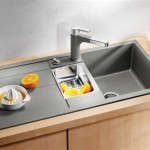Best Gauge For Stainless Steel Sink
When choosing a stainless steel sink, one of the most important factors to consider is the gauge. The gauge refers to the thickness of the metal, and it can have a significant impact on the durability, performance, and overall quality of the sink.
Thicker gauge sinks are generally more durable and resistant to dents and scratches. They are also less likely to warp or bend over time. However, thicker gauge sinks also tend to be more expensive.
The most common gauge for stainless steel sinks is 18 gauge. This gauge is a good balance of durability and affordability. It is thick enough to withstand most everyday wear and tear, but it is not so thick that it is excessively expensive.
If you are looking for a sink that is extremely durable, you may want to consider a 16 gauge sink. 16 gauge sinks are thicker than 18 gauge sinks, and they are more resistant to dents and scratches. However, 16 gauge sinks are also more expensive than 18 gauge sinks.
If you are on a budget, you may want to consider a 20 gauge sink. 20 gauge sinks are thinner than 18 gauge sinks, and they are not as durable. However, 20 gauge sinks are also less expensive than 18 gauge sinks.
Ultimately, the best gauge for stainless steel sink depends on your individual needs and budget. If you are looking for a sink that is durable and affordable, 18 gauge is a good option. If you are looking for a sink that is extremely durable, 16 gauge is a good choice. If you are on a budget, 20 gauge is a good option.
Factors to Consider When Choosing a Gauge
In addition to the above factors, there are a few other things to keep in mind when choosing a gauge for stainless steel sink.
- The type of sink: Undermount sinks are more likely to be damaged than drop-in sinks. This is because undermount sinks are supported by the countertop, which can put stress on the sink. If you are choosing an undermount sink, you may want to consider a thicker gauge sink.
- The size of the sink: Larger sinks are more likely to be damaged than smaller sinks. This is because larger sinks have more surface area that can be dented or scratched. If you are choosing a large sink, you may want to consider a thicker gauge sink.
- The frequency of use: If you use your sink frequently, you may want to consider a thicker gauge sink. This is because frequent use can put stress on the sink and lead to damage.
Conclusion
Choosing the right gauge for stainless steel sink is an important decision. By considering the factors discussed above, you can choose a sink that is durable, affordable, and meets your individual needs.

The Ultimate Guide To Choosing A Durable Stainless Steel Kitchen Sink

Best Gauge For Stainless Steel Sinks Chica Dragon

A Guide To Stainless Steel Sink Gauges

Top 5 Best Stainless Steel Sink Gauge Review In 2024

Stainless Steel Sink Gauges 16 Gauge Vs 18 Fenwick

Best Gauge For Stainless Steel Sinks Chica Dragon

Brush Best Gauge Stainless Steel Sink Satin Finish For Kitchen

Top 7 Best Stainless Steel Gauge For Kitchen Sinks Review 2024 Must Watch Before You Youtube

What Is The Best Gauge For A Stainless Steel Sink Usable World

The Ultimate Guide To Choosing A Durable Stainless Steel Kitchen Sink







